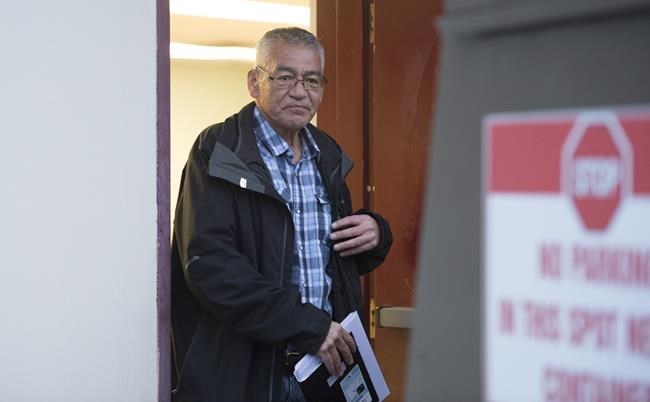SMITHERS, B.C. — Elected chiefs of a First Nation that's split over a natural gas pipeline through their territory say they will not sign a deal on rights and title, a day after the hereditary chiefs backed the agreement.
The elected chiefs of the Wet'suwet'en Nations say they don't support the proposed memorandum of understanding on rights and title reached with the federal and British Columbia governments.
Gary Naziel, a Wet'suwet'en hereditary subchief, said most of the "grassroots chiefs" are opposed.
"Because the way business is being done is not our Wet'suwet'en way and it was done behind closed doors and nothing's out in the open."
It's not about the pipeline but about the proper way of making decisions, he said in an interview on Friday.
"We're trying to put a stop to it. Before we move forward, we need to fix things in a feast hall. The way decisions are being made — it's so erratic now," Naziel said.
"Our system is falling apart before of our own eyes."
The hereditary chiefs' decision to sign the memorandum was announced Thursday in a joint statement they issued with the federal and provincial governments.
A spokesman for the hereditary chiefs could not be reached for comment.
Five elected Wet'suwet'en councils have signed agreements with Coastal Gaslink, the company that is building the 670-kilometre natural gas pipeline through northern B.C. to Kitimat on the coast.
The Wet'suwet'en are governed by both a traditional hereditary chief system and elected band councils.
Prof. Mary Ellen Turpel-Lafond of the University of British Columbia's Peter A. Allard school of law described the memorandum of understanding as a milestone.
"It sets up a process to talk about their rights and titles and recognize and implement (them), and so we can start to resolve their land issues," she said in an interview.
Asked about the position of the elected chiefs, Turpel-Lafond said it was the hereditary chiefs who led the negotiations.
"Of course they have internal issues. Colonialism is very destructive," she said.
"But they are an extremely skilled and talented nation that will chart some new paths."
Details of the memorandum haven't been released but Wet'suwet'en hereditary chiefs and the federal and provincial governments agree it commits them to implementing the rights and title of the First Nation.
Coastal GasLink has government approval for construction of the pipeline, but hereditary house chiefs of the Wet'suwet'en say the company has no authority to build the pipeline through their territory without their consent.
Their opposition sparked demonstrations and blockades that shut down large parts of the national economy in February.
Elected chiefs say that the memorandum consultation process "lacked any semblance of credibility," and they are asking for withdrawal of the hereditary chief's "premature" announcement.
"The federal government, the provincial government and the hereditary chiefs have completely ignored many clan members and elected chiefs," says the statement signed by five elected chiefs.
The negotiation process did not include openness or respect, it says, and fails to give a voice to all clan members.
"Negotiations cannot move forward until all parties agree to discuss governance amongst the Wet'suwet'en people so that we can work together with all levels of government," says the statement.
In announcing the proposed memorandum of understanding, senior governments and hereditary chiefs agreed there's a lot of work ahead in the negotiation process, including how all sides will work together.
Wet'suwet'en hereditary chiefs have invited B.C.'s Indigenous relations minister, Scott Fraser, and Carolyn Bennett, the federal minister of Crown-Indigenous relations, to sign the pact on May 14.
"We look forward to advancing this important work to implement Wet'suwet'en rights and title as three equal governments," said Thursday's statement.
The memorandum has been framed as addressing broader land claims rather than an agreement over the pipeline. It was reached after days of discussions in Smithers and work on the pipeline resumed after it was announced.
The dispute also involves other unsettled land rights and title issues, including who has the right to negotiate with governments and corporations, the fact that the land is not covered by a treaty and remains unceded, and a 1997 court case that recognized the hereditary chiefs' authority and the exclusive right of the Wet'suwet'en peoples to the land but did not specify the boundaries.
The pipeline first generated widespread national protests in January 2019 when the RCMP enforced an injunction obtained by the company to dismantle obstacles on a remote logging road in northern B.C.
Larger protests were held across the country this February after the RCMP enforced a second injunction.
— By Elizabeth Leighton and Hina Alam in Vancouver
This report by The Canadian Press was first published May 1, 2020.
The Canadian Press

